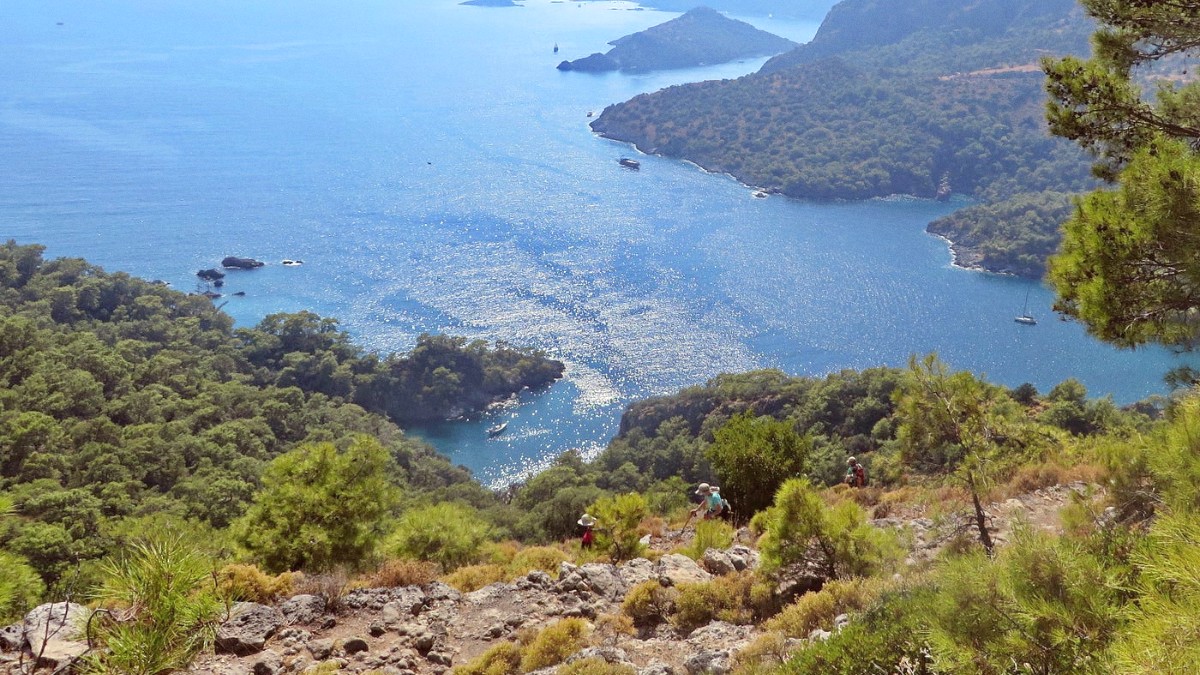
Mediterranean Coast, Turkey
Summer (June - August): These months bring hot, dry weather. Temperatures often range from 30°C to 40°C (86°F to 104°F), with peaks sometimes exceeding this. High humidity is common, making the heat feel more intense. Precipitation is minimal, ensuring clear, sunny skies for beach days and water activities. The sea temperature is at its warmest, inviting long swims. The air feels thick and warm, especially midday. Evenings offer some relief, but remain warm and pleasant, ideal for outdoor dining. This period is when the region truly embodies the classic Mediterranean summer vacation.
Winter (November - March): Winter brings cooler temperatures, typically ranging from 10°C to 18°C (50°F to 64°F). Humidity is higher during these months. Significant rainfall occurs, specifically from December to February, often in heavy bursts, though sunny days also intersperse the wet periods. The sea is too cool for most swimming, and many tourist-oriented businesses may close. The air feels crisp, and while it can be wet, there are also many clear, beautiful days. This season presents a quieter, more authentic view of Fethiye.
The summer heat can be intense. Sun protection measures, including High-SPF sunscreen, Wide-brimmed hats, and Sunglasses, are necessary. Maintaining good hydration by drinking plenty of water is also very important. Seek shade during the hottest parts of the day, typically between 11 AM and 3 PM.
Winter can bring heavy rainfall, which might lead to flash floods in some low-lying areas or affect road conditions, especially in mountainous regions. It is good practice to check local weather forecasts before planning daily outdoor activities during this season.
Hot & Crowded
Ideal for beach/water activities. All tourist facilities open. Lively atmosphere.
Most crowded, higher prices. Very hot temperatures uncomfortable for sightseeing/hiking.
Pleasant & Balanced
Comfortable temperatures for all activities. Fewer crowds, lower prices. Sea warm for swimming.
Smaller facilities may have limited hours. Higher potential for rain in October.
Cooler & Authentic
Significantly fewer tourists. Lowest prices. Lush, green landscape. Authentic local life.
Cooler temperatures, frequent rain. Many tourist businesses close. Limited water activities.
June to mid-October. The sea is warmest, and all facilities are open. Paragliding operators run frequent flights.
April-May and late September-November for hiking. Shoulder seasons (April-May, September-October) for sightseeing. Avoids peak summer heat.
Summer offers prime conditions for sunbathing and swimming.
Spring and autumn temperatures favor hiking and historical site visits.
Year-round cultural experiences, with low season a calm local view.
Sea temperatures are best from June through October.
Shoulder seasons present the most comfortable overall conditions.
Regulations vary by nationality. Checking the most current information for your specific passport is recommended. The official Republic of Turkey Electronic Visa Application System is the main resource for e-visas.
For US, UK, Canadian, and Australian citizens, an e-visa is generally needed for tourist purposes. Apply online through the official Republic of Turkey Electronic Visa Application System.
Many EU nationals (Schengen Area members) do not need a visa for tourist stays up to 90 days within a 180-day period. Policy changes; specific country requirements differ. Check official Ministry of Foreign Affairs site.
Prices fluctuate significantly based on the season and your spending habits. The official currency of Turkey is the Turkish Lira (TRY).
Tipping is appreciated in Turkey, but not always as high as in some Western countries.
Fethiye is generally considered a safe destination for tourists. Violent crime against tourists is rare.
Traveler's Diarrhea: A frequent ailment for visitors to new destinations. Prevention: Drink only bottled water. Avoid tap water, even for brushing teeth. Be cautious with raw or undercooked food, especially from questionable sources. Ensure that food, notably meat, is cooked thoroughly and served hot. Peel fruits and vegetables yourself if unsure of cleanliness.
Sunburn/Heatstroke: High risks during hot summer months. Prevention: Use high-SPF sunscreen generously and reapply often, especially after swimming. Wear a wide-brimmed hat and sunglasses. Seek shade during peak sun hours (11 AM - 3 PM). Stay hydrated by drinking plenty of Bottled water throughout the day.
Fethiye has a range of medical facilities. Fethiye State Hospital is a public hospital. Several private clinics also operate, often with faster service and English-speaking staff.
Pharmacies (Eczane) are widespread and well-stocked, offering over-the-counter medications and basic health advice.
For health emergencies: Dial 112 (unified emergency services - police, ambulance, fire). Operators often speak English.
Tap water in Fethiye is generally not considered safe for drinking for tourists. It is safe for showering and washing, but use bottled water for drinking and brushing teeth. Bottled water is readily available.
For sustainable travel, a Filter water bottle like a Water-to-Go Filter Water Bottle is a responsible option.
Exercise caution with street food vendors. Choose busy stalls with a high turnover of customers. Ensure food is cooked thoroughly and served hot.
Travel insurance is strongly recommended for all travelers visiting Fethiye. A comprehensive policy should cover medical emergencies, emergency evacuation, trip cancellation/interruption, lost/delayed luggage, and personal liability.
Obtain a travel insurance policy before departure. SafetyWing and World Nomads are options.
Read the fine print to understand what is covered, especially concerning activities like paragliding or scuba diving, which might require specific add-ons.
| Category | Details | Recommendation |
|---|---|---|
| Petty Crime | Can occur in crowded places (markets, bus stations). | Keep valuables secure, be aware of surroundings. |
| Neighborhoods | Fethiye town, Çalış Beach, Ölüdeniz are generally safe. | Standard travel precautions always apply. Avoid walking alone in poorly lit areas late at night. |
| Natural Disasters | Earthquakes (minor tremors possible), Wildfires (summer). | Familiarize with emergency procedures. Heed local warnings; avoid open fires. |